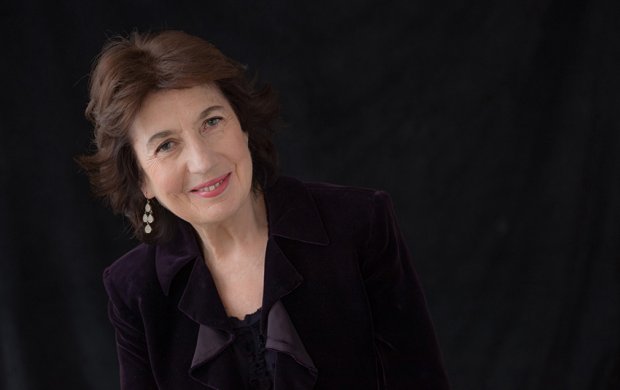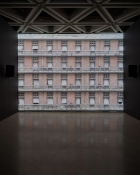That the latest in the series of Istanbul Recitals was given is, in itself, remarkable considering…
My companion and I boarded the boat that leaves Eminönü at ten past six and spent an hour watching the shores of the Bosphorus sweep by on a cloudy, overcast afternoon that was turning to dusk. Having disembarked in Emirgan and shivered in the wind that was ruffling the waves, we took refreshment at a nearby café, making our appearance in the foyer of The Seed, the concert hall attached to the Sakıp Sabancı Museum, 15 minutes before the recital was due to begin. Usually crowded with concert-goers at this hour, the foyer was on this occasion almost deserted except for the organiser, who was standing there rather like a ship’s captain looking out from the prow of her ship, wondering no doubt what the luck of the sea might have in store as she peered into the darkness ahead. As far as the quality of the recital was concerned, she need not have worried: it was a superlative performance, though very few people were there to witness it.
Imogen Cooper (photo Sim Canetty Clarke) is a Londoner who received her first piano lessons from Kathleen Long (1896–1968), a teacher at the Royal College of Music who was not only the recipient of a CBE for ‘services to music’ but was also decorated by the French government for her performances and recordings of the works of Gabriel Fauré. Like her pupil, Ms Long was a champion of new music. Imogen Cooper then went on to be ‘intensively mentored’ (her own words) by Alfred Brendel, Arthur Rubinstein, the Amadeus Quartet and Clifford Curzon. (The British pianist Clifford Curzon (1907–82) was a pupil of Artur Schnabel, Wanda Landowska and Nadia Boulanger.) Like Kathleen Long, Ms Cooper is a CBE, having been awarded this honour in 2007. Best known for her interpretations of Schumann and Schubert, she is famed for her lyricism, colouristic range and ability to capture contrasting moods. The organisation that bears her name, the Imogen Cooper Music Trust, was founded in 2015 to ‘support young pianists at the cusp of their careers and give them time in an environment of peace and beauty’. It organises summer schools and master classes. ‘We live in a world that is beset by distractions, and where the lean towards commercialism can sap the concentration on music in all its depths,’ she writes on its website. I hope I may be permitted to observe, without being considered disrespectful, that the wish to withdraw from the world is quintessentially Virgoan (she is a Virgo); the Tarot card associated with the sign is entitled ‘The Hermit’. Idealism, meanwhile, is of course Piscean.
Respected Reader, the next five paragraphs are about astrology. If this is a topic that does not interest you (and it does not have to), you may wish to skip them.
Before describing the concert, I wish to add an astrological note on the planet Neptune and the sign of Pisces. Pisces, a water sign and the last in the zodiac, is co-ruled by Neptune, the god of the sea, and Jupiter, the planet of expansion and good fortune. Apart from the sea, Neptune also rules all other forms of liquid (including gases and mists) – as well as idealism, deception, self-deception, illusion, the cinema, alcohol, drugs, the collective unconscious and trade unions. That last one might raise an eyebrow, but if you consider the fact that Neptune is a transpersonal planet that affects people as a whole rather than the individual, and that both the collective unconscious and trade unions are transpersonal phenomena, it may not be so surprising after all. (On what does the cinema have an influence, by the way? Answer: the collective unconscious.)
On March 14 the sun was moving through the sign of Pisces. Neptune is also in Pisces, and has been there for a long time; in fact, we have recently had a conjunction between the sun and Neptune. What has all this got to do with the concert, you may ask. Well, here’s a clue: it consisted largely of pieces by Franz Schubert, born in Vienna on 31 January 1797. An examination of his birth chart yields some interesting information.
Although a sun-sign Aquarius, Franz had his Moon in Pisces. His Ascendant in early Cancer, another water sign, was forming an almost exact triangle (in astrology we call a 120-degree angle of this kind a ‘trine aspect’) with his Midheaven, the indicator of career. Franz’s Midheaven was in the sign of – Pisces. Trine aspects between planets are regarded as harmonious, showing that the areas in a person’s life which come under the jurisdiction of the planets involved are going to be easy to manage; indeed, the person may well have a marked predilection for them. Neptune, the ruler of Franz’s moon-sign, was in Scorpio (yet another water sign), and it was making trine aspects both to his Ascendant and to Jupiter, which was in – Pisces. As Jupiter is the co-ruler (with Neptune) of Pisces, the triangle between the two further emphasises the Piscean element in his birth chart.
Oh, and one more thing: two additional areas that Neptune rules are – music, and contagious diseases. Guess what Schubert was particularly good at, and what he died of? (Having both the sun and arch-villain Pluto in the eighth house, the realm of sex and death, can’t have helped the poor guy, and neither can the hard square aspect between bad boy Saturn in the twelfth house – that of ‘self-undoing’ – and his moon. He died of syphilis.) And does ‘contagious diseases’ strike a contemporary chord, I wonder?
By now you will probably have deduced that Schubert was on the menu for the recital on March 14, and you would be right. I apologise for the long delay in getting down to business, but the astrological coincidences were just too extreme to ignore…
Imogen Cooper began her programme in Emirgan with Schubert’s six Moments Musicaux, which are (along with the Impromptus) some of the composer’s most popular pieces. They are available on YouTube, played by the lady herself, in six separate recordings – which are as follows:
With her very first notes, Ms Cooper demonstrated that she possesses an extraordinary degree of sensitivity and subtlety, immediately creating an intimate atmosphere that was ideally suited to these short, lyrical pieces. Her pianissimo tone, in particular, was exquisite in its calm intensity, especially in the second iteration of the theme of the second piece (this comes at 00:36 in the above recording) and in the recapitulation at 05:07. In the fourth, where the music comes to a stop and is followed by a subito piano surprise new theme at 01:20, the sounds she produced from the instrument were of an almost unbearable sweetness: here and in many other places throughout the concert she exploited the bell-like but also slightly smoky tone of the Steinway she was playing to the max. This is not to say that tautness was lacking in her playing when the music required it – as it is in the fifth piece, a blitz of barbed F sharp.
The most popular of the Moments Musicaux is the third, but my favourite is the sixth. I love those sweet-and-sour chords with F flat, the flattened sixth note of the scale of A flat major, followed by the all-too-brief excursion into the sunnier climes of A major and the final emotional collapse into A flat minor. This part, which starts at 02:10, is to my mind a good illustration of how Schubert pushed back the frontiers of chromaticism so that all Schumann had to do was follow the trail his predecessor had blazed. By the time this, the last of the pieces, had finished, Ms Cooper had cast such a spell over me with her achingly wistful playing and astonishing emotional range that I did not want the charmed atmosphere to be broken by applause.
The second item on her programme was Idyll und Abgrund, 6 Schubert Reminiscences by the composer, conductor and clarinettist Jörg Widmann (1973–). Abgrund means ‘abyss’, by the way. I have already remarked on Imogen Cooper’s championing of new music; in these pieces she demonstrated her ability to bring off abrupt contrasts – dark rumblings interrupted by jagged clusters of notes in the high register, for instance. But leaving aside the technical excellence of the performance, I can find little of a positive nature to say about the work itself, which sandwiches snatches of Schubert between unrelated atonal passages. The only one of the pieces I actually enjoyed was the third, in which the element of quotation is less conspicuous: instead, the composer produces something Prokofiev-like in its minimalist coldness.
My companion claimed to have detected a tone row or two, but alas! I was not giving the work my full attention, being fully preoccupied with pain management. Asymmetry may indeed be the flavour of the moment, but for my money the juxtaposition of the music of the 1820s with that of the age of the drone simply does not produce a satisfactory meld. (I would argue, by the way, that the least successful of the works of Alfred Schnittke are those – such as the Concerti Grossi – in which he attempts to combine ancient and modern.) But then, perhaps ‘a satisfactory meld’ is not what Idyll und Abgrund sets out to achieve. One of the graven images the more extreme modernists set out to smash to asymmetrical smithereens is something called ‘musicality’. Also, I thought that in some parts of the piece (such as the passage that begins at 04:15 in the recording below), the composer was actually making fun of poor Franz. Having said all that, though, I enjoyed the part where the pianist whistles. So did the pianist.
According to Widmann’s Wikipedia entry, in 2018 he was the third most performed contemporary composer. I wish him continued success – in the creation of his own personal style, free from derived material. Anyway, here is a video of Idyll und Abgrund, 6 Schubert Reminiscences being played by Leif Ove Andsnes:
Then came the interval, and I found to my astonishment that I was able to buy a Turkish coffee in the foyer without having to queue. What a treat! (That sounds callous, I know. I hope the organisers will forgive my self-indulgent enjoyment of the sparseness of the audience. The truth is that I felt uniquely privileged to be played to as if in the intimate atmosphere of a private salon.) Outside on the windswept and rain-lashed terrace, I found to my satisfaction that my companion agreed with my estimate of Ms Cooper’s performance of the Schubert: he too, had found it a superlative one. How can she possibly maintain the same high standard in the second half, we wondered.
But she did. The Schubert sonata was prefaced, however, by three Chopin Mazurkas – Op. 7 No. 1 in B flat major, Op. 7 No. 4 in A flat major, and Op. 68 No. 2 in A minor. The following performances of these works are by Arthur Rubinstein:
The first of these mazurkas was played by Ms Cooper in a relaxed, unhurried manner that left lots of time for the trills and grace notes to be savoured to the full. In the middle section of the second (the D flat major part that transitions to A major), she produced a misterioso tone that contrasted most effectively with the bright mood of the rest of the piece; in fact, it was so subdued as to be only just audible – not that I have a problem with that. In the third, the ghostliness she imparted to the melody turned the piece into a completely different experience from the one Arthur Rubinstein gives the listener. If held over a fire and forced to make a criticism, I would say that the pedalling was ever so slightly intrusive. But then, I hope not to be held over a fire.
The recital concluded with a Schubert sonata – the G major, D894. Here is a description by Blair Johnston on the ‘AllMusic’ website.
I do not usually list the ‘Wikipedia’ entry for a work, but in this case I will: the ‘Mood and character’ section not only tells you what Robert Schumann said about the piece, but also quotes the opinion of Ms Cooper: https://en.wikipedia.org/wiki/Piano_Sonata_in_G_major,_D_894_(Schubert)
True to form, her performance of Schubert’s G major sonata was an absolute joy. In the first movement, the chords were translucent, the fortissimo passages satisfyingly sharp-edged and forthright, the running passages unvaryingly even (always a big point with Schubert, I feel), and every note painstakingly graded. In the Andante slow movement, there was just enough rubato, but never too much; Ms Cooper allows herself quite a generous helping of this commodity, but her phrasing is so good that you immediately accept her modifications to the underlying rhythm. The odd wrong note in the descending broken chords in the hard-nosed forte section (which explores various minor keys) was entirely forgivable – it is not easy to adjust to a wide spread of the hand after a more static passage. In the rumbustious third – the Menuetto, with its adventurous chords and dissonances – the contrasting second theme was breathlessly quiet and beautifully understated: suddenly, we were in the charmed realm of timeless Rivendell. Then, at the beginning of the Allegretto finale, the pianist swung into the jaunty, insouciant and somewhat tongue-in-cheek mood with panache; as we were expertly coaxed into re-entering the human world (sigh), her feminine delicacy of touch was the perfect anodyne.
We are fortunate enough to have studio recordings of Imogen Cooper performing this sonata. There is one video for each movement, and I will take them one by one. In the first, the playing is of course excellent throughout, but I am particularly impressed by the way she creates a series of contrasting moods in quick succession from 10:10 onwards: after a long tinkly bit, she produces a gorgeous ritardando at 10:45, snaps immediately into another fortissimo outburst, then steers the boat out of the rapids – and once again we find ourselves gliding effortlessly down the placidly-flowing stream:
Now, here is her second movement: things get more than a little fraught, it is true, but after the piece has landed in D minor at 06:44 there is a release of tension, and the pianist’s transition to the major key at 06:58 is exquisitely timed. This leads into a quiet episode in a slower tempo (at 07:13) that allows us to be eased gently into the recapitulation – which follows after a pause of just the right length. It all adds up to a superb piece of carefully-crafted musical drama:
In the third movement, the contrasting second theme (call it the ‘trio’ if you will – this is the part that was so understated in the performance in Emirgan) comes at 02:00. The write-up by Blair Johnston may describe it as ‘gracious’, but in Ms Cooper’s version it begins in a decidedly introverted and reflective mood, becoming more Chopinesque later on:
Now for the finale with its cheerful, occasionally bucolic – even, at times, jokey – mood. The modulations that begin at 02:12 are really quite daring for their day, but this all adds to the jollity. Another series of modulations comes at 04:03; this one skilfully extricates itself from a succession of remote keys in such a cheeky manner that I am tempted to describe it as ‘1820s pop’. The rapid up-and-down scales at 04:26 are executed with just that lightness of touch that I have already praised, and at 05:02 Ms Cooper demonstrates once again her ability to switch gears and turn on a dime. Wonder at the delicacy with which she sets you swaying in your seat at 05:49, and marvel at the expertise with which she brings the piece to a close: you can actually see the tired dancers taking their final curtsey. In this staggeringly perfect rendition, Imogen Cooper brings before our eyes what in ancient China would have been called ‘the paradise time of the River-Mountain Festival’, giving us a glimpse into an ideal world. Enjoy!
After the sonata, Imogen Cooper thanked the audience for turning out to hear her ‘in such difficult circumstances’. Then, as an encore, she gave us a Mazurka by the Polish composer and pianist Karol Szymanowski (1882–1937). This is an early modern composer I have a lot of time for, and full marks to her for giving him an airing on the concert platform. Szymanowski wrote a large number of Mazurkas – twenty-two, to be exact. Here is a recording of them by Anna Kijanowska. I particularly like the first one she plays, and hope it encourages you to listen on:
Thus concluded an unforgettable concert. Imogen Cooper’s performance of Schubert’s Sonata in G major was, in a word, masterful – completely thought out and perfectly executed. Her ability to match every new section in a piece – every individual episode within it, even – with a completely different pianistic style, switching from the fast lane to the purling streams of Arcadia at the drop of hat, reminded me of Nikolai Demidenko’s performance in Emirgan last November. What marked her out as absolutely unique, however, was her pianissimo tone – so delicate and ethereal that within it one could almost hear the voices of the Little People coming through. And no, it wasn’t the piano, good though that may be: it was something timeless and unearthly. I have never had that experience at a piano recital before.
I will leave you with a quotation from her own words, and a few more astrological observations. One of the things she says on the ‘Imogen Cooper Music Trust’ website is the following:
‘The experiences I had of being intensively mentored by Alfred Brendel, Arthur Rubinstein, the Amadeus Quartet and Clifford Curzon have never left me. Time seemed irrelevant, the sessions had no boundaries and the immersion in great works with those artists has resonated with me throughout my performing life.’
‘Time seemed irrelevant, the sessions had no boundaries’ … Hmm. The planet that dissolves boundaries and takes us outside time is our old friend Neptune. An investigation of her birth chart reveals that Imogen Cooper, born on 28 August 1949, has Venus in the ninth degree of Libra, and Neptune in the fourteenth degree of that same sign. In other words, she has a Venus-Neptune conjunction. In his book Planets in Transit, the eminent astrologer Robert Hand says that this astrological configuration gives one ‘a refined sense of beauty’. On a day when it occurs by transit (rather than natally), our ‘creativity can be truly inspired’; it motivates us to ‘create the real out of the ideal’.
Who else had a positive aspect between the planets Venus and Neptune, I wonder? Well, Franz Schubert for one: his Venus was in the thirteenth degree of Capricorn, and his Neptune in the eleventh degree of Scorpio, giving him a harmonious sextile (that is, 60-degree) aspect between the two planets. Robert Hand says of this configuration that it ‘arouses the creative and romantic imagination … Aspects of reality and perception that you are normally not aware of are yours under this influence.’
So there is, it appears, a similarity between Ms Cooper and the composer whose music she plays so well in the matter of other-wordliness and enhanced sensitivity to beauty. But you do not acquire the ability to do anything perfectly without a certain amount of graft: : at the time of her birth, the Sun – in Virgo, the sign of the perfectionist – was approaching a conjunction with hard task-master Saturn, the planet of discipline and persistence. Perhaps it is this fact that gives her performances their authority.
I am grateful for having had the privilege of listening to Imogen Cooper play – all the more so as the prospects of hearing live music in the immediate future appear to be diminishing. Many congratulations to Mr Mehmet Şükûn and Ms Nazan Ceylan for having had the good judgement to bring her to Emirgan – where as my companion and I left the concert hall, the lights on the opposite shore of the Bosphorus twinkled to us across the heaving waves, and I thought I almost caught sight – thanks to Ms Cooper – of the boundary of the King of Elfland’s kingdom receding into the night.







